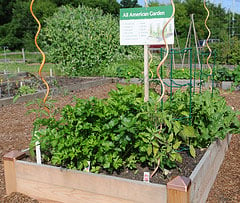Tending Your Garden
 Densely planted raised beds don't require as much weeding as regular garden beds. Shown here is our All-American Garden in late June.
Densely planted raised beds don't require as much weeding as regular garden beds. Shown here is our All-American Garden in late June.Planting intensively keeps weeds to a minimum. In the early spring you may need to weed a little every week, but by midsummer your weeding chores should be over. When weeds do crop up, you’ll want to remove them quickly so your vegetable plants aren’t competing for moisture, nutrients and root space.
The soil in a raised bed doesn’t dry out as fast as it does in a regular garden. The sides of the bed help retain moisture and the plants shade the soil to reduce evaporation. Once plants are well-established, your watering chores should be minimal except in hot weather and periods of drought. See the following section on Watering for more information.
Crops that grow take three or four months to mature usually benefit from a second, midseason application of fertilizer. Almost all vegetables appreciate a monthly dose of water-soluble fertilizer, especially one that includes humic acid, seaweed and fish emulsion. These water-soluble nutrients are immediately absorbed by plants and help keep them healthy in periods of stress. This is an easy way to minimize pest and disease problems.
You can begin harvesting food from your garden just as soon as it looks ready to eat. Crops are usually tastiest and most nutritious at or just before their peak of ripeness. Remove any spent fruit or foliage, as well as any damaged or diseased plant material. Keep an eye out for pests and address any issues promptly (our Pest and Disease Directory can help you identify potential problems).
Some plants, including pole beans and most tomatoes, need a cage, trellis or another type of support to grow properly and produce a good crop. Plant supports also save space, help keep the garden neat and make it easier to access plants for harvesting.
You will also need to fertilize your plants to keep them healthy and maximize productivity. We recommend using a granular, all-purpose organic fertilizer at planting time and again midseason. You may also want to have some garden fabric (row covers) for transplanting and frost protection, plant ties, and a watering wand or watering can. For more ideas, see all of our products for raised bed gardening.
To learn more about growing a bountiful harvest of vegetables in a raised bed garden, we recommend All-New Square Foot Gardening by our friend Mel Bartholomew. It's the most popular gardening book of all time.
Print this Article:
Get the Dirt
Stay up to date on new articles and advice. Please fill out the information below.
